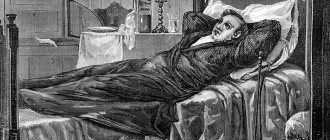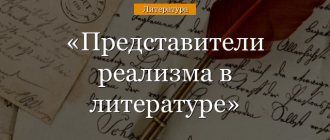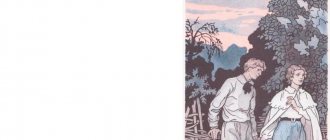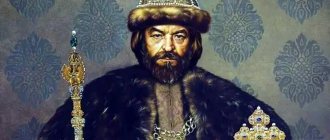Analysis of the satire “On those who blaspheme the teaching”
In the first satire, Kantemir creates vivid pamphlet images of opponents of science and persecutors of education in Russia at that time. Four types of representatives of the noble class were identified as objects of satire. It is no coincidence that the satire begins and ends with impressive images of clergy. The reactionary elite of the Russian church, according to Kantemir, personified dogmatism and scholasticism.
Priest Crito complains that the parishioners, who in former times were “quiet and submissive”, sacredly and thoughtlessly believed in the fathers of the church, have lost their former obedience. Nowadays, according to Crito, young people do not follow the precepts of their fathers, but show curiosity, wanting “to know the reason, the reason for everything. Showing little faith to the sacred rite.” Oddly enough, Crito is embarrassed even by the fact that people are beginning to show interest in the main book of the Church - the Bible. Refusal of blind faith is the path to spiritual emancipation and, as a result, a decrease in the authority of the church.
According to Crito's statement,
The schisms and heresies of science are children,
Those who are given more understanding lie more;
Those who melt over a book come to godlessness...
Another enemy of education and science is the landowner Silvan. In his opinion, studying the phenomena of nature and the world is as absurd and stupid as “sculpting peas into a wall.” Science is especially useless for the nobility, because the ability to prove the validity of their judgments is the work of the “vile”, i.e. people of low origin. For a “noble” person - a nobleman, as Silvan is convinced, it is enough to affirm or deny something without any evidence:
Argument, order in words - vile that is the case,
Nobles can confirm or deny boldly.
The third of the satirical types created by Cantemir is the reveler Luka. He rebels against science because, according to him, it is an obstacle to a fun life. Doing science requires solitude, and people of science give up merry parties for the sake of “dead friends” (books). It should be noted that behind the external playfulness of Luke’s statements lies a tough and irreconcilable position. By setting forth the conditions under which he chooses wine over books, Luke makes it clear that this will never happen.
The fourth type, generated by blind imitation of the West, unbridled extravagance and panache, is Medor. He speaks with obvious disdain about science, and puts the fashionable St. Petersburg tailor above the Roman statesman and orator Cicero, and values the shoemaker Yegor, famous at that time in St. Petersburg, above the Roman poet Virgil. Medor is upset that due to the development of printing, he may not have enough paper to curl his hair:
Medor complains that there is too much paper coming out
To write, to print books, and it comes to him,
That there’s nothing to wrap your golden curls in...
In addition to these types of “detractors of science,” Kantemir exposes the ignorant and bribe-taking judge, who believes that his job is only to sign papers, and that it is the secretary’s responsibility to sort things out. The image of a bishop, the prototype of which was the Novgorod bishop Georgy Dashkov, is caustically and wittily drawn. Cantemir mocks the desire of church hierarchs for pomp and solemnity during their “appearances to the people,” which should cause fear and admiration:
If you want to be a bishop, put your cassock on,
On top of that, the body is proudly striped
Let him cover it, hang a chain of gold around his neck,
Cover your head with a hood, your belly with a beard...
Kantemir complains with bitterness and resentment about the plight of science and education in Russia:
Science is torn, trimmed in rags,
From all the houses it was knocked down with a curse;
They don’t want to get to know her, her friendships are running away...
However, the writer’s final judgment is optimistic and significant. In the final stanza of the satire, Cantemir expresses a deep thought that devotion to science makes a person internally free and therefore invincible and fearless:
Life is fearless, even though it seems hard,
Who lurks silently in his quiet corner...
Analysis of the satire “On the envy and pride of the evil nobles”
In the second satire - “Filaret and Eugene” (“On the envy and pride of the malevolent nobles”) Kantemir clarifies the problem of true nobility, the origins of which he sees in the civic virtues of the nobleman, his ability and willingness to serve the Fatherland. Defending Peter's Table of Ranks, which allowed humble people to occupy high positions in the state, Cantemir asserts the extra-class value of a person. “Adam did not give birth to nobles,” writes Cantemir and adds that his descendants were simple farmers:
We completely left them, one earlier
Leaving a pipe, a plow, and another later.
The satire is written in the form of a dialogue between the nobles Eugene and Filaret. Eugene cannot come to terms with the fact that he is not taken into account, treated with rank and favors, although he has many noble ancestors. Filaret tells his friend that it is merits and virtues that make a person worthy and noble, and not noble origin. Making fun of the laziness, extravagance and idleness of young dandy nobles, Cantemir paints bright, expressive pictures of their life and behavior.
Summary: Satires
The first satire, “On those who blaspheme teaching,” describes the arguments of opponents of science. Crito considers them the causes of church strife and schisms. Previously, people stood at the service because they had to do so, without understanding its essence and relying on the wisdom of the priests, but now they began to study the Bible on their own. Now the people neglect fasting, bowing to shrines, and even begin to believe that it is not appropriate to assign land to monasteries. Hoarder Silva believes that learning also brings with it hunger, for unlearned peasants reaped a larger harvest. The nobility also makes no sense to comprehend the essence of the universe; all kinds of management and trading techniques can be mastered without science. Besides, science is boring and interferes with fun, which ruins a fun company. The dandy Medor complains that it takes a lot of paper to produce books, that he has nowhere to wrap his twisted curls. But Cicero and Virgil are not worth a penny compared to a handy tailor or shoemaker.
Without unnecessary knowledge, it’s easier to find a warm place. To become a bishop, all you have to do is grow a beard and put a hood on your head; to become a judge, you can even put on a wig with knots and send away everyone who comes without a bribe. But knowing the laws is the job of clerks. The second satire, “On the envy and pride of malevolent nobles,” describes a conversation between the virtuous Philaret and Eugene, who has a high rank. Filaret finds Evgeniy in an extremely bad mood and guesses the reason for this: many people of lower rank achieve success, while Evgeniy, from the height of his noble roots, achieved nothing. This worries Evgeniy; it’s a shame to be last in everything with such ancestors. Filaret answers as if in spirit that nobility, not backed up by one’s own achievements, means little. Certificates should confirm a person’s merits, and not be his only merits received at birth. Evgeniy himself says that the ancestors earned honor through their own efforts and accomplishments. He has nothing like this in his soul, for when his ancestors marched with an army against the enemy, he reclines on feather beds, surrounded by numerous servants. Then the author describes a day in the life of the master. He gets out of bed late in the morning, after drinking tea or a cup of coffee, he preens himself, with the help of a servant, puts on tight shoes, clothes for the village at a price, and then indulges in gluttony along with imaginary friends who will leave him if he loses his fortune. And Evgeniy himself brings this day closer by playing cards every single day, having thus already lost several villages.
And high positions require knowledge and abilities. For navigation, Evgeniy has neither the knowledge nor the courage to steer the ship, the judge must diligently study the laws and be merciful, but Evgeniy is ignorant and cruel: he beats the peasants for any offense until the bones crack, and due to constant losses at cards, he does not disdain any ways of making money. Eugene is too lazy even for a courtier, because this requires patience and hard work. For example, Cleitus, who works at court, knocked on the thresholds of the front halls around the clock, carefully choosing his words so as not to cause anyone’s dissatisfaction. You should learn from him in order to later use this skill for good. Eugene's ignorance only makes his life more difficult. First, he should correct himself, and then try to find a place for himself in the sun. Roots, whether they are noble or not, mean little. No matter how noble the family may be, a good name must be supported by deeds, not the other way around.
In the seventh satire, “On Education,” the author discusses the importance of public opinion. for example, there is an opinion that knowledge is available only to older people, and a young man cannot give practical advice. And why? It is also believed that any person is prone to deception, but in fact it all depends on upbringing: what trait to develop will manifest itself in character. Therefore, Peter himself traveled to foreign countries, looking out for the best in them and opening educational institutions for his subjects. Raise a person correctly and he will achieve a lot. Regardless of talents and position, one must be a virtuous person: the abilities on which the evil mind relies will not bring their owner to good. It’s better to be an undistinguished but kind person than an evil genius.
Children need to be raised not by dogma, but by example. Whenever a bad trait appears in a child, you need to show him someone who is harmed by it: a rich man languishing over his wealth, a sick fornicator. You also need to carefully choose his surroundings; it’s not for nothing that people say, “To live with wolves is to howl like a wolf.” But the most important thing is that parents themselves must represent what they are trying to teach the child, because seeing evil from the father, the son will only learn evil. Most will not take such advice from a young man seriously, the author concludes, but then they may not read these poems at all.
Please note that this is only a brief summary of the literary work “Satire”. This summary omits many important points and quotes.
Analysis of the satire “On Education”
In the satire “On Education,” Kantemir argues that human behavior in society depends not on innate properties, but on upbringing, which, according to the writer, should begin from infancy. The satirist sees the tasks of education in
So that the heart, having driven out passions, matures
To establish good morals so that through this you will be useful
Your son was kind to his fatherland and kind to people
And always desirable - that’s why all sciences
Everyone must give their hands to the end and art.
The theme of Peter I occupies a special place in the satire. Kantemir considers Peter an outstanding teacher and reformer, all of whose activities were an example for the Russian people. Peter, according to Kantemir, “... traveled himself to set an example in foreign lands to take what cannot be found near Moscow...”
"Satires"
The first satire (“On those who blaspheme the teaching. To your mind”) opens with the famous verses: “The mind is immature, the fruit of short-lived science! / Rest in peace, do not force my hands to write..."
The satirist lists the arguments of those who consider science unnecessary. The prude Crito sees in them the cause of godlessness: “The schisms and heresies of science are children; / People who need to understand more lie more.” Previously, people obediently went to church services and listened to it without understanding. Now, to the temptation of the Church, they have begun to read the Bible themselves, have forgotten about fasting, do not drink kvass, have forgotten how to bow and light candles, and believe that monasteries do not belong as patrimony. The hoarder Silva says that learning brings hunger: without learning Latin, they collected more grain. A nobleman should not speak competently and comprehend the reason for the world: from this he will not know how much the clerk steals or how to add the number of barrels from a wine store. “Ruddy-faced, having burped three times, Luka sings along”: science prevents people from having fun and destroys the company. Wine is a divine gift; a cheerful person, leaving the glass, will not take up the book. The dandy Medor complains that there is a lot of paper used for books, and he no longer has anything to wrap his curls with; Virgil and Cicero are not worth two money in front of a good tailor and shoemaker. “Here are some of the speeches that ring in my ears every day.”
And it is clear that without science it is easier to achieve success. To become a bishop, it is enough to cover your head with a hood, your belly with a beard, and, puffed up in your carriage, hypocritically bless everyone. It is enough for the judge to raise his bow with knots and scold those who come empty-handed. He doesn’t need to know the laws: it’s the clerk’s job to climb paper mountains.
Every ignoramus imagines himself to be worthy of the highest rank and honors. So the mind does not need to seek these honors, but, sitting in its corner, it must keep within itself the knowledge of the benefits of science, and not explain it to others.
The second satire (“On the envy and pride of the malevolent nobles”), a dialogue between Filaret (“Loving virtue”) and Eugene (“Noble,” i.e., noble). Filaret meets Eugene in great sadness and guesses the reason for this: “Tryphon was given a ribbon, Tullius with villages / Awarded - you and the ancient names are despised.” Evgeniy confirms. He is upset that yesterday's pie makers and shoemakers have jumped to a high level, but he, with his nobility, has achieved nothing. “My ancestors were already noble in Olga’s kingdom” and since then they ruled both in war and in courts, “And my father was already on top of everyone - so he was gone, / The right shoulder of the state fell away with him.” It’s a shame, having such ancestors, to see yourself last everywhere.
Filaret answers in detail and frankly. Nobility is an important thing, but it must be achieved or confirmed by one’s own merits. But a letter, “gnawed by mold and worms,” does not give a person any dignity: “It is of little use to call you even the son of a king, / If in morals you are not equal to the hounds of the vile”; The same blood flows in the nobles as in the slaves. Evgeniy has no merits to his fatherland, and he himself admitted that his ancestors received their ranks and awards only according to merit. “The rooster crowed, the dawn rose, the rays illuminated / the sun’s tops of the mountains - then the army was led out / to the field by your ancestors, and you are under the brocade, / deepened softly in the fluff of body and soul, / you sniffle menacingly until two days pass by...”
The following describes the day of the dandy. In the morning he basks for a long time, then drinks tea or coffee, combs his hair whimsically, puts on tight shoes (“The sweat falls from the servant, / Two calluses and you become beautiful”), puts on an outfit worth a whole village and chosen with an art that is more complex science of Roman law. Then he indulges in gluttony, surrounded by vile friends who, of course, will leave him as soon as he squanders. Evgeniy constantly brings the hour of his ruin closer by indulging in extravagance and gambling: he has already lost more than one village.
And to occupy important positions, you need a lot of knowledge. Eugene, on the other hand, knows nothing of the complex military science, is afraid of the sea and is not capable of steering a ship. The judge can be the one who “Wisely does not let go of Petrov’s laws, / Which we suddenly became a new people,” and is also kind-hearted - Eugene, in addition to his ignorance, is insensitive and cruel: he laughs at poverty, beats a slave until he bleeds, that he waved his left hand instead of his right, and in his extravagance considers all ways to replenish an empty wallet to be legal. He cannot even deserve court ranks. Eugene is lazy, and court ranks are obtained through trouble and patience. There is the courtier Cleitus: he spends whole days in other people's hallways, carefully measures his words so as not to offend anyone, and at the same time goes straight to his goal. It is not a sin to learn such qualities in order to use them for good deeds.
In a word, Eugene’s evil character makes him good for nothing: “Correct yourself and then, my friend, expect a reward; / Since then, don’t consider it a shame to be forgotten.” And the fact that Tullius and Tryphon do not have noble ancestors does not mean anything. Just as Eugene’s ancestors began a noble family under Olga, so Tryphon and Tullius now began theirs. Adam did not give birth to nobles, and Noah in the ark saved all the farmers equal to himself. “We all left them completely, some earlier, / Leaving the pipe, the plow, the other later.”
The seventh satire (“On education. To Prince Nikita Yuryevich Trubetskoy”) is more of an epistle than a satire: a detailed presentation of thoughts about the subject of discussion. The poet begins by denouncing the general opinion that intelligence comes only with age and that therefore a young man cannot give sound advice. Why such a prejudice? Many people say that a person is naturally inclined to indulge in deception, but in fact, more depends on upbringing: any field will dry out if it is not watered; any one will bear fruit with skillful care. Peter the Great knew this, who himself sought to look for good examples in other countries and opened schools for his subjects. Correct upbringing is the path to perfection: “The main thing of upbringing is / So that the heart, having banished passions, matures as an infant / In good morals, so that through this it is useful / Your son will be useful to the fatherland, kind among people / And always desirable - to All sciences and arts must give their hands to this end.”
You can be a great scientist or warrior, but no one will remember a malicious and unkind person well. Only virtue can give a person a calm conscience and fearless anticipation of death. A simple mind with a clear conscience is better than a sharp mind with malice.
There is no need to constantly repeat strict rules to children and scold them, especially in public - this will only discourage the love of virtue. It is best to lead by example. Having noticed a bad inclination in your son, you need to point out to him someone who suffers from it: a miser who has dried up over his gold, a spendthrift in prison, a sick lust. It is necessary to carefully choose servants and the entire environment for the child: it greatly influences the upbringing. Often a son loses his virtue in the arms of a slave and learns from the servants to lie. The worst example of all is parents. There is no point in giving instructions to a child if he constantly sees evil in his own father. Whoever cannot avoid evil himself, let him hide it from his son: after all, no one will show a guest the disorder in his house, and children are closer than the guest. To many, such instructions from a young man will seem like nonsense, the poet concludes, so they may not read these poems, which were written just for fun...




